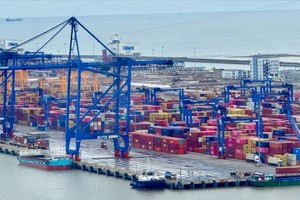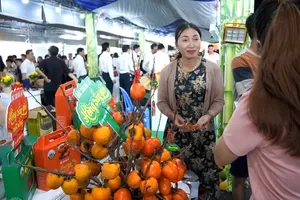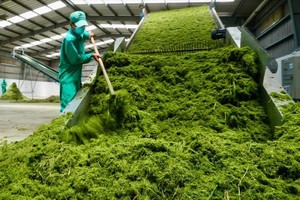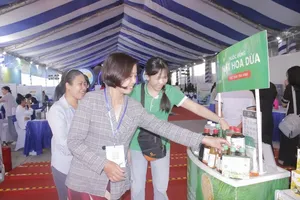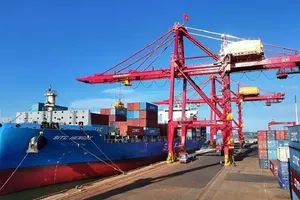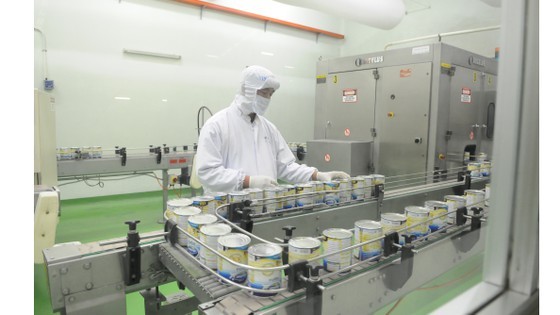
Tuong An Vegetable Oil Joint Stock Company said that its business result in the first quarter of this year increased by 23 percent and its pre-tax profit rose by VND37 billion year on year. Similarly, meat producer Vissan Joint Stock Company, Saigon Food Joint Stock Company, Acecook Vietnam Joint Stock Company, and Vietnam Food Industries Joint Stock Company (Vifon) all raised their capacity by 40-50 percent in the first quarter of this year to meet the rising demand of domestic consumers.
Although the growth rate was not as high as the food and foodstuff processing industry, the rubber, plastic, chemicals, pharmaceuticals, processing, and manufacturing industries also recorded stable growth rates.
Mr. Nguyen Hoang Ngan, CEO of Binh Minh Plastic Joint Stock Company, said that his company saw an increase of around 10 percent in both production, revenue, and profit thanks to good demand in the first quarter of this year. From the perspective of enterprises, although the pandemic developed complicatedly, domestic consumption still maintained steadily. Since the beginning of February, the consumption of food and foodstuffs in the market even increased sharply as people bought goods to stockpile when implementing the Directive No.16 of the Government on social distancing and travel restriction.
As for export markets, technology transformation and quality improvement have started to gain positive signs when Vietnamese products have approached the food safety standards of many choosy export markets.
Moreover, enterprises have also taken initiative in the source of raw domestic materials which also contributed to their business growth rates.
Mr. Nguyen Hoang Ngan said that his company’s competitive edge is that 100 percent of raw materials are domestically made so raw materials are not affected by the exchange rate, shipping time and costs, and raw material stockpiling. From last year, the company has switched to online ordering so the complicated pandemic merely affects its operations.
Contrary to enterprises with mainly domestic market share, several export enterprises in various sectors have been struggling as export orders were delayed and canceled. According to the Vietnam Association of Seafood Exporters and Producers, many enterprises have proposed the Government to reduce power charge and warehouse rental at ports. Of which, goods are mainly gathered at Tan Cang Port, accounting for 90 percent of the number of goods waiting for export as the import of goods has been suspended by their partners.
Noticeably, import partners cannot determine the time of import resumption so many enterprises have had to store goods at ports, resulting in high costs of electricity and warehousing.
Garments and textiles, wood, and footwear industries also experienced the same situation. The Vietnam Leather, Footwear and Handbag Association said that since the beginning of March to now, most export goods have had to store at warehouses. Enterprises have to wait for the notice of import partners from the US, and Europe.
Currently, many small and medium-sized enterprises have temporarily suspended operations. Some garment and textile enterprises have switched to producing medical face masks to meet the large demand in the European and US markets but just a few enterprises can export face masks because of a lack of necessary certificates. Amateur face mask producers who only temporarily switch to make face masks to maintain their operations and wait for the export markets to open again cannot meet standards to get these certificates.
The representative of 28 Corporation One Member Limited Liability Company said that from early April the company has switched to produce antimicrobial face masks. Samples have been offered for sale in the European, US, and some Asian markets, but so far, the company has not received any response.
Standing firmly in the domestic market will be a solid springboard for enterprises to reach foreign markets, reducing risks from market fluctuations, including diseases, exchange rate differences, shipping costs, and raw material shortage.
However, according to many enterprises, the conversion of market share requires a certain investment route. Therefore, it is necessary to accelerate the support package, debt rescheduling, tax extension, and fee reduction to create conditions for enterprises to maintain as well as change production activities, reducing the risk of exhaustion in the context of a long-lasting pandemic.
Although the growth rate was not as high as the food and foodstuff processing industry, the rubber, plastic, chemicals, pharmaceuticals, processing, and manufacturing industries also recorded stable growth rates.
Mr. Nguyen Hoang Ngan, CEO of Binh Minh Plastic Joint Stock Company, said that his company saw an increase of around 10 percent in both production, revenue, and profit thanks to good demand in the first quarter of this year. From the perspective of enterprises, although the pandemic developed complicatedly, domestic consumption still maintained steadily. Since the beginning of February, the consumption of food and foodstuffs in the market even increased sharply as people bought goods to stockpile when implementing the Directive No.16 of the Government on social distancing and travel restriction.
As for export markets, technology transformation and quality improvement have started to gain positive signs when Vietnamese products have approached the food safety standards of many choosy export markets.
Moreover, enterprises have also taken initiative in the source of raw domestic materials which also contributed to their business growth rates.
Mr. Nguyen Hoang Ngan said that his company’s competitive edge is that 100 percent of raw materials are domestically made so raw materials are not affected by the exchange rate, shipping time and costs, and raw material stockpiling. From last year, the company has switched to online ordering so the complicated pandemic merely affects its operations.
Contrary to enterprises with mainly domestic market share, several export enterprises in various sectors have been struggling as export orders were delayed and canceled. According to the Vietnam Association of Seafood Exporters and Producers, many enterprises have proposed the Government to reduce power charge and warehouse rental at ports. Of which, goods are mainly gathered at Tan Cang Port, accounting for 90 percent of the number of goods waiting for export as the import of goods has been suspended by their partners.
Noticeably, import partners cannot determine the time of import resumption so many enterprises have had to store goods at ports, resulting in high costs of electricity and warehousing.
Garments and textiles, wood, and footwear industries also experienced the same situation. The Vietnam Leather, Footwear and Handbag Association said that since the beginning of March to now, most export goods have had to store at warehouses. Enterprises have to wait for the notice of import partners from the US, and Europe.
Currently, many small and medium-sized enterprises have temporarily suspended operations. Some garment and textile enterprises have switched to producing medical face masks to meet the large demand in the European and US markets but just a few enterprises can export face masks because of a lack of necessary certificates. Amateur face mask producers who only temporarily switch to make face masks to maintain their operations and wait for the export markets to open again cannot meet standards to get these certificates.
The representative of 28 Corporation One Member Limited Liability Company said that from early April the company has switched to produce antimicrobial face masks. Samples have been offered for sale in the European, US, and some Asian markets, but so far, the company has not received any response.
Standing firmly in the domestic market will be a solid springboard for enterprises to reach foreign markets, reducing risks from market fluctuations, including diseases, exchange rate differences, shipping costs, and raw material shortage.
However, according to many enterprises, the conversion of market share requires a certain investment route. Therefore, it is necessary to accelerate the support package, debt rescheduling, tax extension, and fee reduction to create conditions for enterprises to maintain as well as change production activities, reducing the risk of exhaustion in the context of a long-lasting pandemic.
Recently, Vietnam Dairy Products Joint Stock Company (Vinamilk) has successfully exported a shipment of sweetened condensed milk to the Chinese market, although the country is tightening its control over the Covid-19 outbreak. Earlier, Vinamilk had won a $20 million export contract in Dubai, opening a huge market for milk and dairy products in the Middle East. Domestically, Vinamilk still supplies more than 50 percent of the dairy market share.

